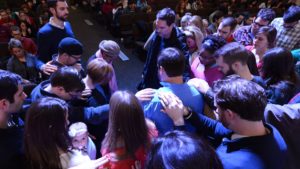
I’m often asked by aspiring missionaries, “What can I be practically doing today to help prepare for my life and ministry on the mission field?” Sometimes they’ll rattle-off ideas:
- “Should I begin studying a new language?”
- “Should I try and develop some kind of specific skill?”
- “Would it be wise for me to take a trip and visit the potential team that I might be joining?”
All of these suggestions are good and even encouraged at one point or another. But the most important thing that potential missionaries can do today is learn to abide and grow in their intimacy and relationship with Christ.
Growing as a disciple of Jesus is more important than learning a language, developing a skill, or taking a vision trip.
Initial Zeal
Often, young people fresh off a short-term mission trip are zealous to get back overseas. They had an encouraging experience somewhere in the world, saw God at work, and sensed that God might be leading them to spend a more significant amount of time overseas. I believe it’s good and right for local churches to celebrate this type of reaction following a short-term trip.
However, just because someone had an encouraging experience on a short-term trip doesn’t mean they’re ready for full-time, cross-cultural missionary service. Furthermore, simply because one is passionate about the Great Commission on this side of the world doesn’t mean they’ll be an effective cross-cultural witness for Christ on the other side of the world.
In writing on this subject, Mack Stiles argues,
I call it the 747 Principle. That is: Getting on a 747 won’t make you holy. Sin here will follow you there. I wish it could be so easy as to develop holiness by simply buying a plane ticket, but there is no transformation by aviation. Churches need to affirm the calling of the individual by a record of deeds done where they live. If the person isn’t fruitful in ministry where they live, they generally won’t be overseas.
Certainly there are some exceptions to what Stiles suggests above. For the most part, however, he’s correct that past and current behavior is the best indicator of future behavior.
Hurried Discipleship
Most Christians today live impatient, hurried, and busy lifestyles. Often, the result (I know this temptation is real in my own life) is a hurried and “quick” time spent in Bible reading, prayer, and communion with Christ. Therefore, the greatest need for aspiring missionaries is a deep, devoted, and dependent walk with Christ on a moment-by-moment and day-by-day basis.
Robert Murray M’Cheyne, the famous Scottish pastor, once said, “The greatest need of my people is my own holiness.” I’d argue this statement is also true for the aspiring missionary as well. Perhaps one of the greatest needs of unreached peoples around the world today is the personal holiness of “sent ones.”
Perhaps one of the greatest needs of unreached peoples around the world today is the personal holiness of “sent ones.”
Missionaries are sent out to share the gospel, make disciples, plant churches, and develop leaders, but their work is often done in vain if they don’t do it out of the overflow of a heart devoted to Christ and his Word. I’d therefore encourage aspiring missionaries to get back to—or to grow in—the simplicity of just having Jesus and spending extravagant time with him on a daily basis.
No Magic Pill
We know from the Bible that God’s exhorts his people to grow in the knowledge and likeness of Christ. The apostle Paul in his letter to the church in Rome encouraged Christians to “not be conformed to this age, but be transformed by the renewing of your mind” (Rom. 12:2a). I believe Paul’s command is applicable and serves as a timely reminder for aspiring missionaries today.
God has specifically designed daily Bible reading, prayer, discipleship by more mature brothers and sisters, and fellowship and encouragement in the context of the local church to conform us more into the image of Christ. This is his plan for sanctification and maturation as disciples of Christ.
There’s no magic pill that can make someone turn into Adoniram Judson, Jim Elliot, or Lottie Moon overnight.
In the end, there’s no magic pill that can make someone turn into Adoniram Judson, Jim Elliot, or Lottie Moon overnight. In all of this, we must acknowledge there really is no such thing as transformation by aviation. Rather, our desire is to see disciples who live a transformed life in the here and now.
Once that transformed life is clearly evident in this context and affirmed by local church leadership, then we want to send these transformed brothers and sisters out to be used as agents of reconciliation all across the globe. But before walking onto that plane, let’s all remember the words of Jesus, who said: “I am the vine; you are the branches. The one who remains (abides) in me and I in him produces much fruit, because you can do nothing without me” (John 15:5).
Paul Akin is the senior aide to IMB President David Platt. He can be found on Twitter @pakin33.


